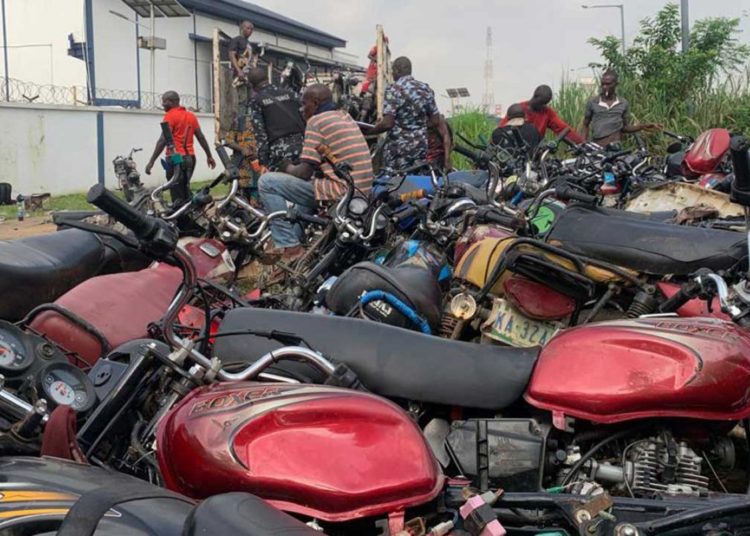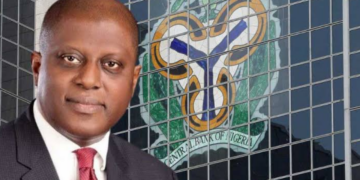Months after five persons reportedly died and goods worth billions of naira burnt at the popular Furniture Market in Dei-Dei, a community in Abuja Municipal Area Council (AMAC) of the Federal Capital Territory (FCT), when commercial motorcyclists, popularly known as okada riders clashed with traders, following the death of an unidentified woman amid other atrocities carried out by the motorcyclist, residents have cried out over the activities of commercial motorcyclists in the nation’s capital saying they are causing more harm than good.
The residents who spoke to LEADERSHIP Weekend decried the increasing state of lawlessness amongst Okada riders in Abuja and called on Federal Capital Territory Administration to save them from the menace as well as commence clamp down on the motorcycle operators in the acclaimed fastest-growing city in the world.
A staff of the FCTA, Fred Idachaba, lamented the rate at which okada riders move with impunity on major roads in the FCT amid security threats in the city, saying it has shown that the administration lacks the political strength to fully exact the ban on okada as claimed.
According to him, “These okada riders are daring, they are ready to attack anybody at any time, because they are always prepared, with dangerous weapons like daggers with them. The truth is that they are presently the most dangerous set of people in the FCT and the government seriously needs to do something about them because they pose a serious security threat to us.”
Corroborating Idachaba claims another resident of the nation’s capital, Mrs. Ene Igado Bishop explained how she boarded an Okada rider at Dutse Makaranta to Kubwa village, but the okada rider took her to an unknown destination under the guise of using a shorter route to her destination.
Bishop alleged that unknown to her the motorcyclist was a ritualist agent.
She explained that it was when she found herself on a large lonely pumpkins farm near a big mountain on the outskirts of Kubwa, that was when she realised that she had been kidnapped and needed to do everything within her power to run for her life.
“With God on my side, I escaped from the okada rider when he pretended to be checking something in his motorcycle, not knowing he was waiting for his partner in crime so that they could execute their evil plans.
“When his partner arrived, they engaged in a heated argument, luckily I understand Hausa language, so I understand their gimmicks.
“That was when I started running yet they chased me, fortunately for me, I was able to escape from them,” she said.
This is one among other evils perpetrated by okada riders, which is one of the reasons the FCT administration must ban the activities of okada riders in the territory.
It would be recalled in 2006, during Mallam Nasir El-Rufai’s administration as the FCT minister, in the second phase of former President Olusegun Obasanjo’s administration on October 1, 2006, he banned the use of motorcycles as means of commercial transportation in the FCT metropolis, but this did not go down well with many residents of the FCT who depended on motorcyclist to get to where cars could not reach.
The residents believed then that El-Rufai was out to carry out an unpopular agenda, and was quoted to have said that the FCT was not for poor people; so the ban of okada from the city gave credence to the anti-people’s policy.
During that period, most people failed to take into cognizance the rising number of casualties from accidents involving okada riders which then continued to increase exponentially on a daily basis, and the risks were prevalent with reports of security personnel deploying that mode of transportation.
However, to appeal to the conscience of the residents who felt disappointed at the El-rufai policy, the FCTA decided to lessen the burden of the policy by restricting okada riders to Abuja suburbs and on roads servicing residential areas.
Despite the restriction to the suburbs, okada riders continued to defy the ban and can be found on highways and even Trunk A and Trunk B roads in the FCT even during peak hours.
In the course of all the defilement of the ban, some passengers have many negatives experienced at the hand of lawless okada riders who are getting out of control, they still go out to wreak havoc and have victimized most of their passengers.
A good example of such havoc was the tension months ago when Same Global Estate was thrown into confusion and panic when more than 100 motorcyclists attacked the estate and burnt two houses to allegedly avenge the death of two of their colleagues reportedly killed by a motorist.
It was reported that a motorist hit and killed two okada riders and ran into the estate for safety which reportedly angered the motorcycle riders who decided to set fire to two houses in the estate.
“Also, apart from some physical havoc perpetrated by Okada riders, they are believed to constitute over 50 percent security threats in the FCT, as there have been several reports of okada riders using their bikes to perpetrate crimes such as kidnapping for ransom and most times for ritual purposes,” said a trader Fatima Salisu.
For Musa Ishiaku, a popular Okada rider at Dutse Baupma in the Bwari area council of the Federal Capital Territory (FCT), he explained that he left his family in Kano State to Abuja for greener pastures, because of the good tales he heard about the capital city.
Another okada rider, Ephraim Chukwuebuka at Dutse axis, explained that most times when there is very heavy traffic at Dutse, they charge passengers N400 to N500 from Dutse tipper garage to the express road for them to get a taxi to town, as against N200 to N250 when there is no traffic.
“The truth is that I am a graduate, but the fact that I have searched for a job for more than three years in Abuja, I decided to become an okada rider, so that I can save up money to buy a car for public transport. We enjoy the booming part of the job, mostly during the traffic period when passengers are in a hurry to go to work or home.
“A few weeks ago, when that trailer carrying scraps fell on the road, the kind of gridlock along Mararaba – Nyanyan road, I was told that riders were charging N1,500 to N1,000 to get to AYA roundabout, while N700 to N500 from Kugbo to AYA. That is why it is very difficult for us to stop the business despite the ban by the minister,” he said.
A cleaner at National Assembly who speaks on the condition of anonymity said, “It is obvious that since the FCT administration started the ban on okada operators, the riders are now taking laws into their own hands in the territory, as they are now regarded as a nuisance on many major roads, posing serious threats to residents as well as other road users.”
Reacting to the development, the senior special assistant on Monitoring, Inspection, and Enforcement to the Minister of FCT, Ikharo Attah, explained that the minister of FCT, Malam Muhammad Bello, gave an order that okada riders should be removed from the major road.
“Most times we find them driving against traffic on the expressway, contravening traffic rules, behaving unruly, and hurting people. Okada riders do not understand the resolution of the minister of FCT to keep the city clean and properly under control, they think they could have ungoverned spaces to operate.
“The okada riders along Lugbe FHA and Lugbe Car Wash have been a problem, while we are removing them from the expressway, some of them in Lugbe Car Wash attacked our men. During the process, we recovered knives, cutlasses, and other dangerous weapons from them,” he said.
No Decision Yet On Okada Ban, Says Federal Govt
According to information obtained from the FCTA, the administration has been crushing thousands of commercial motorcycles due to violation of the law, that in 2022 alone, more than 3,000 seized motorcycles have been crushed in line with its ban on okada operations in the nation’s capital.
Also, the director of the FCT Directorate of Road Traffic Services, Dr. Abdulateef Bello, believes that crushing motorcycles would serve as a deterrence to other stubborn ones.
“The DRTS Task Force always demonstrates a substantial capacity to manage the enforcement, but it would not be enough without the cooperation and support of the command and control established in the FCTA with the support of the joint security task force being managed by the FCT Police Command.
“Motorcycles cost N350,000 and when impounded, it is enough pain for them, the same with Taxi drivers and rickety vehicles.
“We are humans as well, when we take this from them, we believe we’ve taken so much and one thing fundamental about enforcement is that we’ve realised that the best answer to sustain enforcement is more enforcement.
“When you take somebody’s okada worth N350,000, you know for sure that you’ve taken something very important to the person, if the person is hit by another one and he is apprehended we will crush it again.
The FCT Commissioner of Police, Sunday Babaji, who was represented by the deputy commissioner of police, Hauwa Ibrahim, on one of the occasions where motorcycles were crushed said the reason behind the impounding of motorcycles in Abuja, was as a result of criminal activities being conducted by some persons, using motorcycles.
“They use them in snatching of bags, bank robberies, attacks on residential areas and they are becoming a security threat to the security of FCT. On that note, there was an outcry that led to the banning of motorcycles within the city in 2006 by the FCT Administration, since then we have been working together in impounding okada,” he said.
An Abuja-based security analyst, Mr. Donatus Samuel, berated the VIO’s policy of crushing seized motorcycles, describing the situation as very bad, that it shows the cruelty of the government and its agencies towards the masses.
“From investigation, the okada riders whose bikes have been crushed without other means of survival resort go into banditry, kidnapping, burglary, one-chance attacks, and armed robbery, among other crimes in Abuja,” he said.





